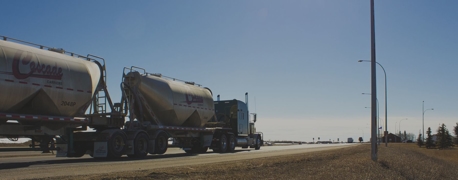Truck Drivers: Does Your Company Pressure You to Break the Rules?

Let's say you're a truck driver whose employer insists that you take another trip—even though this would violate hours of service (HOS) limits—and then your employer threatens your wages or job itself if you don't comply. This would be an example of coercion as defined by the Federal Motor Carrier Safety Administration (FMCSA), which is fully illegal. In this article, we will take a closer look at what coercion means for truckers, who they can hold accountable for it, what their legal protections are, and more.
Coercion & Truck Drivers
According to the FMCSA, coercion is when a motor carrier, shipper, receiver, or transportation intermediaries force truckers to drive in violation of certain regulations. In this context, permitting this force to be exerted on a trucker is also considered coercion.
This type of forced dispatch is when one of the above parties coerces a driver to violate:
- Federal Motor Carrier Safety Regulations (FMCSRs)
- Federal Motor Carrier Commercial Regulations (FMCCRs)
- Hazardous Materials Regulations (HMRs)
- Hours of Service regulations (which don't apply for exempt drivers or truckers on certain jobs)
For example, this could look like an employer taking adverse actions against a driver unless they agree to drive past their HOS limit, to go on the road even though the truck is in desperate need of vital repairs, or to drive a route that doesn't comply with HMRs.
What is an adverse action? This could look like an employer threatening to fire the driver, reduce their pay, deny them jobs, threaten them with physical violence, remove their benefits, etc., unless the driver complies with their unlawful order and doesn't report the illegal act either.
This rule doesn't just protect employees of trucking companies. Independent contractors are also protected by these rules from being sent on forced dispatches.
Who Can Be Guilty of Coercion?
As far as the trucking industry is concerned, employers such as motor carriers are usually the main culprits that commit coercion. However, other parties can exert illegal pressure on truckers as well or go along with an employer's coercion. These parties would include shippers, receivers, and transportation intermediaries.
The pressure to violate trucking regulations doesn't have to be directly applied by one of these parties to count as coercion. If for example, a driver is being coerced by their employer to drive in violation of HOS standards, and the driver lets the shipper or transportation intermediaries know about this coercion, then it is on those parties to either request the motor carrier send another driver with hours to spare, or to contact another company for a driver. If they've been told about the forced dispatch and send the coerced driver with a load anyway, then that shipper or transportation intermediary would also be on the hook for violating FMCSA rules that prohibit coercion.
However, if a driver doesn't tell these other parties that they're being coerced by their employer, those parties aren't liable for the coercion.
Potential Penalties a Trucking Company Could Face
The penalties for coercion are meant to take away whatever financial benefit the company was trying to squeeze out of their operations by violating regulations. Penalties can include fines of up to $16,000 per violation, and in serious cases, a motor carrier could have their operating authority revoked.
A Few Real-Life Examples of Coercion Cases
One Idaho carrier, Cargo Express, was fined $90,000 by the Department of Labor to pay a truck driver who was owed back pay and punitive damages for wrongful termination. This driver had refused to drive his assigned truck because it had oil and air leaks, and for this he had been unlawfully fired.
In another case that's pending, a Tennessee driver got into a crash after he said he'd been driving 22 hours across state lines for a haul. He said that his carrier, AAA Freight Inc. made him drive 20-30 hours straight, on no more than two hours of rest. When the driver informed Amazon that he didn't have enough hours left to take on another load, this was dismissed, and then someone from AAA Freight threatened the driver with job loss unless he took that load anyway. If substantiated, this claim would be an example of coercion committed by both an employer and a shipper.
Another allegation that would constitute coercion if confirmed was a case where a driver informed her carrier that she was far too sick to drive safely and legally, and her codriver didn't have the hours either. After this job refusal, she was fired, even though that was the right, lawful decision by a driver in that situation.
These are just a few samples of what coercion can look like, and it's not as infrequent as it should be.
How Often Does Coercion Happen?
Per the FMCSA, there were 68 acts on average of verified coercion each year between 2009 and 2012. During that same timeframe, OSHA said that 253 of the whistleblower complaints they received were worth investigating. Ever since the updated FMCSA rules that followed in 2016, coercion complaints more than doubled by 2018 (from 403 complaints to 826), with that number seeming to be a reliable indicator of the pace of complaints in years to follow.
What Can Truck Drivers Do About Coercion?
If drivers have a coercion complaint, they have 90 days to report it to the FMCSA. Their written coercion complaint would need to go to the Division Office of the state where they're employed, or they can file a coercion complaint with National Consumer Complaint Database. Other parties such as shippers can also use this database to file a complaint.
Whenever possible, it's important to have documentation of any forced dispatch, such as text messages, emails, and other recordable communication that shows the coercion taking place.
Whistleblowing Protections for Truck Drivers
If an employer takes adverse action against a private-sector driver for reporting coercion, this would be considered retaliation, and the driver would have OSHA whistleblower protections. This adverse action can include an employer responding to a driver that filed the complaint by creating a hostile work environment in order to induce that driver to quit. This whistleblower protection also applies to independent contractors, mechanics, freight handlers, and other personnel who contribute to the safety or security of qualifying commercial vehicles. If you face wrongful termination or any other adverse action for reporting on illegal practices such as coercion by your employer, then you have legal rights and options that you can assert.
The Importance of Taking Forced Dispatches Seriously
When a commercial motor vehicle is involved in an accident, it is often the case that a fatigued truck driver, an inadequately maintained truck, and/or other violations of trucking regulations are to blame. These crashes often result in serious injuries and fatalities as well.
This means that drivers risk their own health and safety, as well as put others on the road at risk when they agree to a forced dispatch. However, truckers don't have to put up with this illegal practice. There are legal protections in place to protect truck drivers from coercion and retaliation, leaving them with legal options for holding their employer (and others) accountable.


